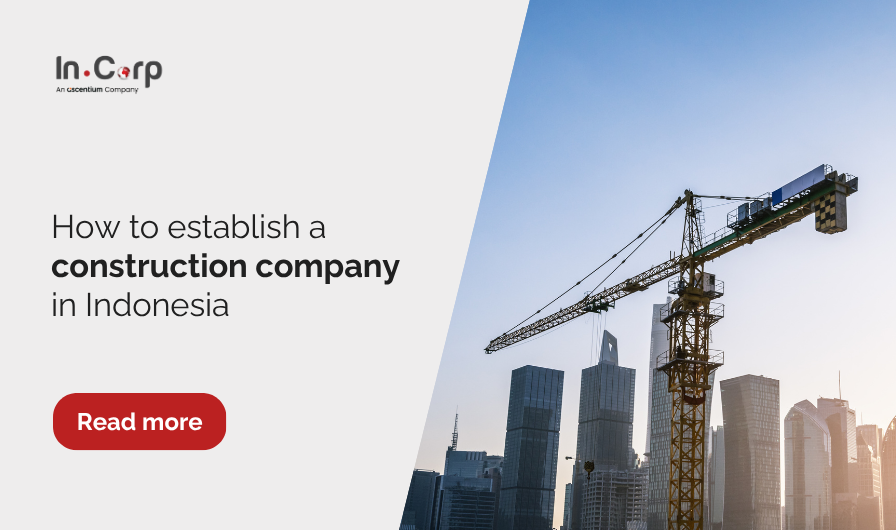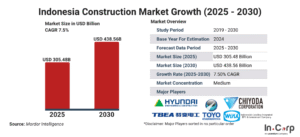Construction companies are key to Indonesia’s fast economic growth, fueling infrastructure and urban development. With many opportunities, this sector attracts both entrepreneurs and investors.
This article will guide you through the sector’s growth, market trends, and how to set up a construction company.
Why invest in Indonesia’s construction sector
Indonesia’s construction industry is growing fast, driven by several key factors that make it an attractive destination for investors. Understanding these drivers can help stakeholders make informed decisions when entering the market.
Strong Government Support
The Indonesian government is heavily investing in infrastructure through its National Strategic Projects. These include toll roads, airports, housing, and more. These large-scale developments create significant opportunities for construction companies to get involved and grow with the country.
Urbanization and Housing Demand
As more people move to cities, the demand for homes, offices, and public buildings increases. Construction companies must build residential areas, shopping centers, and essential services.
Business-Friendly Economy
Indonesia’s government also offers incentives and more straightforward rules for investors, including foreign ones. Combined with a large population and strategic location, the country provides an excellent environment for construction companies to succeed.
Green Construction Demand
Environmental awareness is growing in Indonesia, and there is an increasing demand for eco-friendly buildings. Companies that use sustainable methods and materials stand out and succeed in this market.
Indonesia’s construction industry: 2025 market outlook
Indonesia’s construction market will grow strongly over the next few years. According to recent reports, the industry is expected to reach USD 305.48 billion by 2025 and expand to USD 438.56 billion by 2030, with an average annual growth rate of 7.5%.
This expansion is primarily led by the infrastructure segment, which is expected to account for around 35% of the total market 2024, valued at USD 100.35 billion. The government’s continued focus on major infrastructure initiatives such as highways, rail systems, airports, and ports fueled this dominance. Other key contributors include the residential, energy and utilities, commercial, and industrial sectors.
How to establish a construction company in Indonesia
Starting construction companies in Indonesia involves several key steps to ensure compliance with local regulations and successful business operations. Here’s the comprehensive guide:
1. Conduct Thorough Research
Start by gaining a deep understanding of the construction industry landscape in Indonesia. Identify business types, assess demand, and analyze potential competitors. This knowledge will empower you to make strategic decisions and carve out your niche within the industry, making you feel knowledgeable and strategic.
2. Develop a Detailed Business Plan
Developing a detailed business plan is a key step. It should outline your goals, services, target market, pricing, and how you’ll promote your business. Including financial estimation in your plan will guide your company towards sustainable growth.
3. Obtain Necessary Permits and Licenses
Compliance with Indonesian regulations is mandatory. Secure all required permits and licenses, which may include
- Business Identification Number (NIB): Register through the Online Single Submission (OSS) system.
- Construction Business License (IUJK): Mandatory for companies engaging in construction services.
- Company Registration Certificate (TDP): Officially registers your company with the government.
Read more: 7 ways company registration numbers benefit your business
4. Establish a Competent Team
Hire professionals like engineers, managers, laborers, and administrative staff who can deliver quality work. A strong team is essential for providing quality construction services and building a reputable brand
5. Effective Marketing Strategies
Promote your construction services through various channels. Make a website, be active on social media, and attend industry events to meet potential clients. Regular and smart promotion will help more people find and trust your business.
6. Prioritize Excellent Customer Service
Communicate, finish projects on time, and deliver high-quality work to satisfy your clients. A strong client relationship will contribute to your company’s reputation and success.
Read more: Guide to choosing a company registration consultant in Indonesia
Top 10 construction companies in Indonesia
Indonesia’s construction industry is home to several leading companies that contribute significantly to the nation’s infrastructure development. Here’s the breakdown of those top construction companies:
1. PT Waskita Karya (Persero) Tbk
As one of the largest construction companies in Indonesia, Waskita Karya has played a pivotal role in numerous infrastructure projects, including toll roads, bridges, and airports.
2. PT Adhi Karya (Persero) Tbk
Established in 1961, Adhi Karya has been a key player in various construction sectors, such as transportation, water resources, and buildings. Their diverse project portfolio showcases their versatility and commitment to quality.
3. PT Pembangunan Perumahan (Persero) Tbk
Known for their focus on residential and commercial building projects, Pembangunan Perumahan has contributed significantly to urban development across Indonesia. Their projects range from housing complexes to high-rise buildings.
4. PT Wijaya Karya (Persero) Tbk
Wijaya Karya specializes in engineering, procurement, and construction services. Their involvement in energy, infrastructure, and industrial projects highlights their capabilities in the construction sector.
5. PT Jasa Marga (Persero) Tbk
Primarily focused on toll road development and management, Jasa Marga has been essential in improving Indonesia’s transportation network. Their projects facilitate better connectivity and economic growth.
6. PT Totalindo Eka Persada Tbk
Totalindo Eka Persada is known for constructing high-rise buildings, including hotels, apartments, and office towers. Their expertise in vertical construction has made them a primary choice for urban projects.
7. PT Surya Semesta Internusa Tbk
Surya Semesta Internusa provides property development and construction services. It has developed industrial estates, hotels, and commercial properties.
8. PT Kajima Indonesia
Japan’s Kajima Corporation subsidiary, PT Kajima Indonesia, brings international standards to Indonesian construction projects. Their portfolio includes commercial buildings and infrastructure developments.
9. PT Balfour Beatty Sakti Indonesia
This joint venture combines local knowledge with international standards, focusing on delivering complex infrastructure projects, including transportation and energy facilities.
10. PT PP Presisi Tbk
Specializing in heavy civil construction, PP Presisi offers services in foundation work, structure, and infrastructure projects, supporting Indonesia’s growing construction demands.
Build your construction business in Indonesia with InCorp
Establishing construction companies in Indonesia requires navigating various legal and regulatory processes. InCorp Indonesia offers comprehensive services to streamline this journey, ensuring your business is set up efficiently and in compliance with local laws
Our services include:
- Company Registration: We handle the whole setup process for your business, making it easy and hassle-free so you can focus on running your company.
- Business License: Our experienced team will help you get the proper permits and manage the legal requirements for business in Indonesia.
Ready to build in Indonesia? Contact us today and let us optimize your construction business journey.
Get in touch with us.
What you'll get
A prompt response to your inquiry
Knowledge for doing business from local experts
Ongoing support for your business
Disclaimer
The information is provided by PT. Cekindo Business International (“InCorp Indonesia/ we”) for general purpose only and we make no representations or warranties of any kind.
We do not act as an authorized government or non-government provider for official documents and services, which is issued by the Government of the Republic of Indonesia or its appointed officials. We do not promote any official government document or services of the Government of the Republic of Indonesia, including but not limited to, business identifiers, health and welfare assistance programs and benefits, unclaimed tax rebate, electronic travel visa and authorization, passports in this website.




